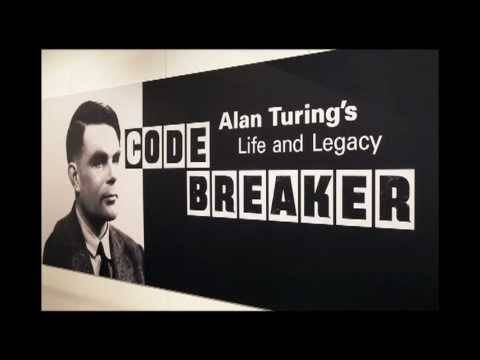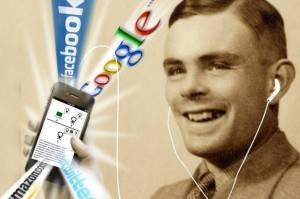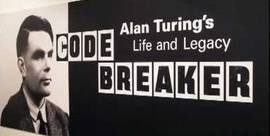
Codebreaker is a documentary about the life and work of British mathematician Alan Turing, who is considered to be the father of Computer Science, but who was persecuted by the British government for his homosexuality and, as a result, took his own life in 1954 at the age of 41. The filmmakers use historical, records, Turing’s own writings, and also interviews with people who knew him to tell the story. Some sessions between Turing and his psychiatrist are reenacted, and Ed Stoppard plays Turing in these scenes.
Turing’s work
The documentary gives an overview of Turing’s work, in part, by talking to contemporary scientists and engineers (including Steve Wozniak) and also through interviews with his aging peers. While brief — the film runs less than an hour and a half — an enormous amount of innovation and discovery is presented.
Turing wrote a paper in the 1930s about the concept of what he called “computing machines,” which all modern computers are based on; he also envisioned how computers would become as important as they are today. During the Second World War, working at the top secret program at Bletchley Park in England, Turing was a key figure in the successful effort to crack German military codes by developing codebreaking machines. By doing so, Turing made an enormous contribution to the Allied War Effort. After the War, he pioneered the concepts of Artificial Intelligence and Morphogenesis.
 The documentary does a wonderful job of exposing those unfamiliar with Turing’s work to his ideas and the incredible influence they have had. The opening lines of the film quote Turing predicting a future where people interact with their computers in the way that we do now — almost as if the machines are people. The various mathematicians and scientists interviewed give clear and thought-provoking explanations of concepts and inventions that changed the world.
The documentary does a wonderful job of exposing those unfamiliar with Turing’s work to his ideas and the incredible influence they have had. The opening lines of the film quote Turing predicting a future where people interact with their computers in the way that we do now — almost as if the machines are people. The various mathematicians and scientists interviewed give clear and thought-provoking explanations of concepts and inventions that changed the world.
Turing’s life
Despite Turing’s vastly influential achievements, he never received the credit that he should have during his own lifetime; the filmmakers point out that his name should be as well-known today as Einstein’s.
Instead of being recognized as the national hero he was — especially considering what he had done for the war effort — Turing was put on trial during the early 1950s by the British authorities for “gross indecency,” since homosexuality was illegal at the time. He was convicted and given a choice between chemical castration and jail. He chose chemical castration. After his conviction, he was monitored by the government, who viewed him as a security risk due to everything he knew about British intelligence in an era in which people who were homosexual were suspect in general.
In conclusion
Codebreaker does a good job of showing both the vision and profound injustice of Turing’s life.
A scene that I especially liked is where the filmmaker goes back to Turing’s old boys school and looks at the handwritten ledger of library books Turing checked out as an adolescent. Another is one in which a woman, whose family was friends with Turing when she was a child, shows a letter he wrote to her in which he drew a diagram showing her how to win a logic game.
In the case of the government persecution of Turing, the film does almost too good a job of showing how he was hounded to the point of suicide. For example, there is an explanation of some of the side effects of Turing’s court-ordered chemical castration — including growing breasts — that is sickening to consider.
I definitely recommend this film — especially to someone who does not know much about Turing’s work and ideas — but it is not something to see casually.
Codebreaker is part of the 4th Annual LGBT Film Festival to be held at the Art Theater every Tuesday in June. It plays tonight, Tuesday, June 4, at 7:30 p.m. For more information about the festival, go here.








